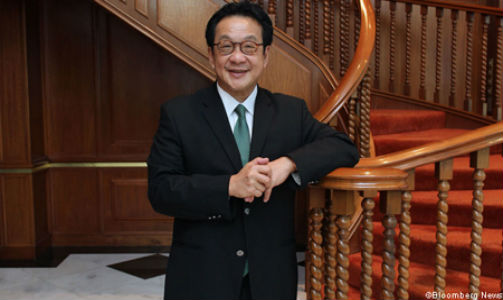Financial Times: Faith in a family conglomerate

FT.com, November 6, 2011
By Rahul Jacob
Francis Yeoh is explaining the management philosophy that guides his conglomerate’s hotel business when the conversation takes an unexpected turn. The YTL managing director is on stage at a large hotel investment conference in Hong Kong with 150 executives from Asia and the US in the audience.
When I ask him how he has built a well-respected hotel division despite YTL’s main focus being infrastructure, he says he learnt an important lesson as a young man from fellow Malaysian-Chinese billionaire and hotelier Robert Kuok, owner of the Shangri La chain. Mr Kuok advised him that in hotels there was an “inverse pyramid where the staff are the most important asset in the company”, because they, not the CEO, are the employees who meet the guests.
So far, so management speak. However, Mr Kuok also cautioned against the tendency of some Asian tycoons to see hotels as a vanity project. He said that “‘the staff will be so upset with this terrible arrogance of yours that they’ll pee in the pool. So when you swim, [remember] not to keep your mouth open’.” There is an audible gasp from the audience – and then loud laughter.
At the end of the Q&A, a queue of people are waiting to speak to him. It is a little while before he can be steered away for his interview.
A civil engineer who studied at Kingston university in west London, the 57-year-old insists there is a common thread that binds the diverse conglomerate he runs. It includes UK water utility Wessex Water, the power plants he owns in Malaysia and Singapore, the airport express rail link his company built and runs in Kuala Lumpur and the hotels he owns in France, Japan and Malaysia. The core competency is emblematic of an engineer: to build and operate large projects more efficiently than others.
Mr Yeoh’s father, who never went to university, started a construction business when he was 30 (YTL are his initials). As the eldest son, Francis took over the business in 1988 but runs it with the help of his brothers. He made a name for himself after a blackout prompted the Malaysian government to allow private power companies in 1992.
YTL is now one of Malaysia’s largest companies, with revenues of 18.35bn ringgit ($5.8bn, €4.2bn) and pre-tax profits of M$2.3bn in the year ended June 30.
A first-generation Christian convert, Mr Yeoh says employees of YTL must master three languages: “the language of God that leads to morality and integrity”; the language of man “to articulate a vision”; and the language of machines, by which he means IT. “I’m not proselytising for my faith, but I tell [my employees] their values must be in that order.”
After acquiring Wessex Water in 2002, YTL sponsored a free concert in Bath featuring Luciano Pavarotti, Plácido Domingo and José Carreras. Written into the contract with the “Three Tenors” was a requirement that they sing the hymn “It is well with my soul”.
In the mid-1990s Pavarotti sang at the inauguration of Mr Yeoh’s Pangkor Laut resort in Malaysia. Mr Yeoh jokingly calls the resort “a fertility clinic” because several couples have conceived while staying there. “Because there’s nothing to do, you end up doing a lot,” he explains.
This year YTL tried to buy Rosewood Hotels, the US hotel company that owns The Carlyle in New York, but was outbid by the Hong Kong-based company New World Hospitality. Sitting on M$14bn in cash, Mr Yeoh is eagerly awaiting a financial crisis and is disappointed there are not more assets up for sale.
“Bubbles should be allowed to pop as in any economic cycle. I hope whatever happens after Greece that governments will not mollycoddle and [prevent the process of] marking to market,” he says. “People are resourceful. That is how we [in Asia] became more disciplined.”
Given this appetite for distressed assets it’s no surprise to find he has closely studied the investment philosophy of Warren Buffett.
“We don’t believe in the buy, polish and sell business. We buy businesses where we can add value with the engineering competency we have,” he says.
This approach skews YTL’s buying towards utilities with long investment horizons – such as a power company in Singapore that supplies a third of the city’s electricity and an electricity grid company in South Australia.
In the case of Wessex Water, which he bought from Enron for £1.4bn, he proudly says it has won the prize for being the best water company in the country for the past four years.
Even though he has built a multinational that derives more than 75 per cent of its revenues outside Malaysia, one country to which Mr Yeoh is not rushing to build power plants or water utilities is China.
Unusually for an overseas Chinese businessman, Mr Yeoh is forthright about saying what China needs to do to improve its investment environment. “Even Hong Kong companies have done infrastructure facilities in China and failed because the Chinese government has not quite grasped the rule of law and the need for sanctity of contracts,” he says.
Like Asia’s wealthiest man, Li Ka-shing, Mr Yeoh prefers investing in infrastructure projects in developed countries with a common-law tradition and a strong regulatory framework. “In the early 1990s we signed a deal with the local authorities to build a power plant [in the Chinese province of Jiangxi]. It was supposed to be exclusive [but then] we realised there were six other contracts being signed in addition to ours,” he says, guffawing at the recollection.
Also view the interview here:-
YTL CEO: China must improve rule of law http://video.ft.com/v/1263695258001/YTL-CEO-China-must-improve-rule-of-law
Back